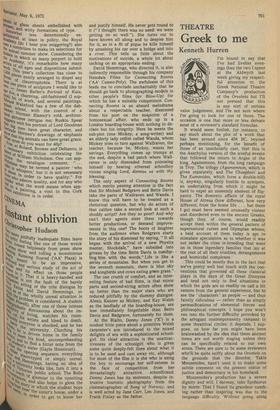41stant oblivion
17:,:istoPher Hudson ?re pitifully inadequate films leave ulloy—Lio feeling like one of those wreck tr4 Asp: ttissed helplessly from press show 'okr1.141-ss sho„, i,141,1111114' z‘urining Scared CAA' Noh. rrleant to be an Plaza) , w and tolling a monotonous is s4i:nd arid serious study impressive, 0. Se er am[d its effect on those people pn of the act lei ° its it is heavy-handed and Nttirto,'"-tal is not the fault of the bar ,e'etent acting or the trite dialogue by Nql Xtori and David Hemmings, in , i ath8 C:If the wholly unreal situation tit 111k 1,-'he Problem is considered. A student 14,tietRtr::,°Well), after one of those intense discussions about the i_ 'ItY of j: : t hes his cut . living, watches c atii his tl) ,'ally and bleed to death. ;a,,,N everyone is shocked, and. he has ci'itsv.`1,._thes drivenuriivershitoym. e Clutching his 14tielltto het University. hi kihd, in the family 4,' and to find a bitter note from the :t4fter"tnt's sister (Gayle Hunnicutt). Zkjither e °Pening sequence, everythingl ,ilorl aridstereotyped or .simpno Sili414 a iiiiiiieMmings, having n idea of unreal. ilk Of v;_yerSity looks like,etoul. it into a it't44a. toll',:ethorian public school. The Rolls NSt,,t'tane., Of glamour to the upsetting Ilphs'' the '8, and also helps to gloss the ' Iltl3ciatst°rY in which the student buys 111.1e near the sister's house, under a , in order to get to know her and justify himself. He never gets round to it ("I thought there was no need: we were getting on so well "). She turns out to have known all along and to despise him for it, so in a fit of pique he kills himself by smashing his car over a bridge and into a river. This tells us little about the motivations of suicide, a whole lot about tacking on an appropriate ending. David Hemmings, who directed it, is also indirectly responsible through his company Hemdale Films for Connecting Rooms ('AA' Cameo-Poly). The awfulness of this leads me to conclude uncharitably that he should go back to photographing models in other people's films (qv Blow-Up) for which he has a suitable competence. Connecting Rooms is an absurd melodrama about a respectable teacher, dismissed from his post on the suspicion of a homosexual affair, who ends up in a London boarding-house with nothing to declare but his integrity. Here he meets the sub-plot (one Mickey, a song-writer) and an elderly lady cellist called Wanda, whom Mickey tries to turn against Wallraven, the teacher, because he, Mickey, wants her savings. Everything comes up trumps at the end, despite a bad patch where Wallraven is only dissuaded from poisoning himself by hearing ethereal schoolboy voices singing Lord, dismiss us with thy blessing. The only aspect of • Connecting Rooms which merits passing attention is the fact that Sir Michael Redgrave and Bette Davis take the parts of Wallraven and Wanda. I know this will have to be treated as a rhetorical question, but why do actors of that calibre take a second look at such a shoddy script? Are they so poor? And why can't their agents steer them towards better productions, or demand improvements in this one? The hoots of laughter from the audience when Redgrave starts the story of his dismissal by saying, "It all began with the arrival of a new Physics master, Stockdale," have subsided into groans by the time Bette Davis is comforting him with the words," Life is like a series of mountains. But when you get to the seventh mountain, there is blue sky and songbirds and cows eating green grass.". The one crumb of comfort, and an interesting feature of bad films, is that minor parts and second-string actors often show up better than the major stars who are reduced pitifully by the slummy dialogue. Alexis Kanner as Mickey, and Kay Walsh as the landlady of the boarding-house, are less immediately forgettable than Bette Davis and Redgrave, fortunately for them. At the Rialto, Danny Jones ('X') is a modest little piece about a primitive Welsh carpenter's son introduced to the mixed delights of sex with a sophisticated schoolgirl. Its chief attraction is the unattractiveness of the schoolgirl who is given some quite deeply-felt lines about what it is to be used and cast away etc, although for most of the film it is she who is using the boy to encourage her self-esteem in the face of competition from her devastatingly attractive schoolfriend. Danny Jones has its moments, despite intrusive touristic photography from the cinematographer of Song of Norway, and is well acted by Jane Carr, Len Jones, and Frank Finlay as the father.










































 Previous page
Previous page